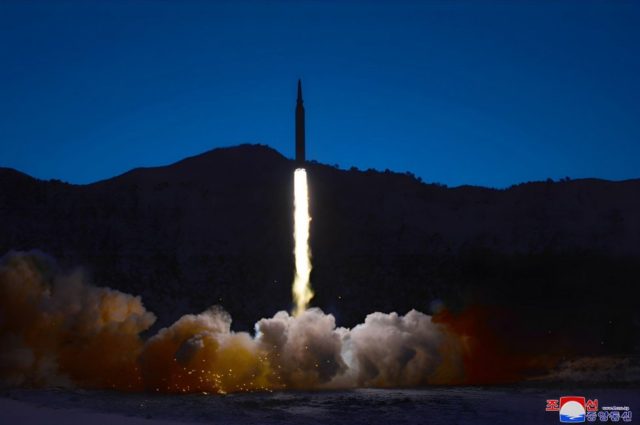SEOUL, Jan. 16 (UPI) — North Korea launched a pair of what appear to be short-range ballistic missiles on Monday morning from its international airport in Pyongyang, the South Korean military said, marking the secretive regime’s fourth weapons test in less than two weeks.
The projectiles were fired to the northeast from Sunan Airfield and traveled roughly 236 miles at an altitude of 26 miles, South Korea’s Joint Chiefs of Staff said in a message to reporters. The JCS detected the missiles, which landed in the sea between Korea and Japan, at 8:50 and 8:54 a.m.
The Japanese military also reported the launches and said that the two missiles landed near the east coast of North Korea and outside of Japan’s exclusive economic zone.
Japan’s defense minister, Nobuo Kishi, said in a statement that North Korea’s repeated launches “threaten the peace and security of Japan and the region, and are a serious issue for the international community as a whole.”
Hawaii-based U.S. Indo-Pacific Command said that Monday’s event did not pose “an immediate threat to U.S. personnel or territory, or to our allies” but served to “highlight the destabilizing impact of the DPRK’s illicit weapons program.” The Democratic People’s Republic of Korea is the official name of North Korea.
The launches are the latest in an unusually busy period of military activity for North Korea.
Pyongyang conducted what it called the “final verification” of a hypersonic weapons program with missile tests on Jan. 5 and Tuesday.
On Friday, the North fired a pair of short-range ballistic missiles into the sea from what it later announced was a railway-based platform.
Earlier that day, Pyongyang had warned of a “stronger and certain reaction” after Washington imposed sanctions on several individuals and entities connected with the North’s weapons program.
Sean King, an affiliated scholar at Notre Dame’s Liu Institute for Asia and Asian Studies, said the missiles are not a specific response to the United States but the continuation of a weapons modernization plan that North Korean leader Kim Jong Un has prioritized since the beginning of last year.
“Kim may time certain launches to coincide with things we say or sanctions that we enact, but he’s already told us he’d do these things anyway,” King told UPI. “Kim’s going to keep testing, no matter what, until he feels he can sit down with Washington from what he thinks is a position of strength.”
U.S. Secretary of State Antony Blinken condemned the flurry of launches on Friday in a call with his South Korean counterpart, Chung Eui-yong, and reiterated Washington’s “ironclad” defense commitment to Seoul.
Washington has repeatedly called on Pyongyang to return to dialogue, but nuclear negotiations have remained at a standstill since a February 2019 summit between then-U.S. President Donald Trump and North Korean leader Kim Jong Un ended without an agreement.
In its statement on Friday, Pyongyang said the Biden administration “is trumpeting about diplomacy and dialogue,” but remains “engrossed in its policy for isolating and stifling [North Korea].”

COMMENTS
Please let us know if you're having issues with commenting.